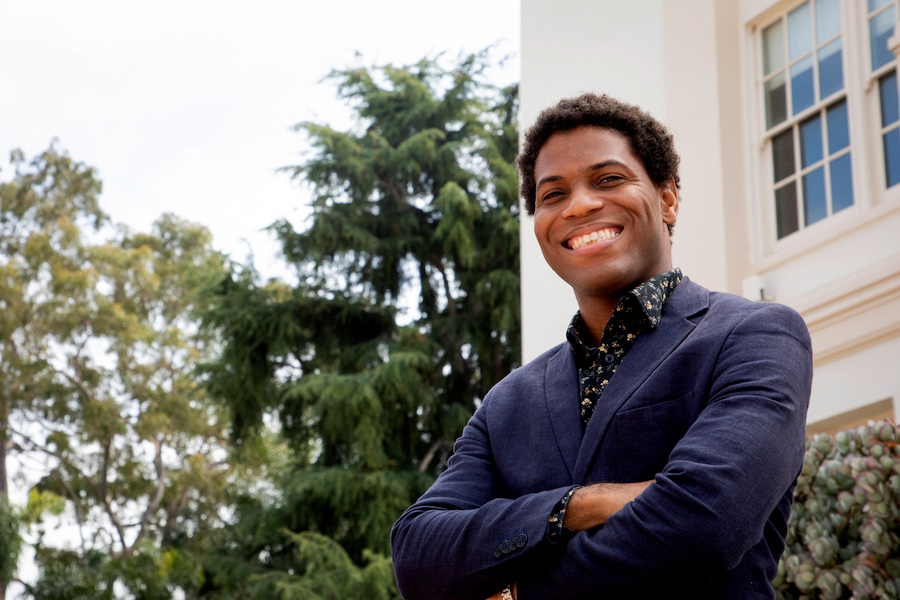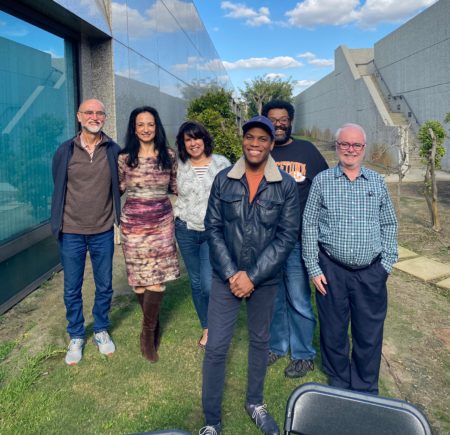
Chris Gipson ’13 grew up in Los Angeles and, through a circuitous route, found an academic home at Loyola Marymount University first as an undergraduate and now as a postdoctoral instructor in the Classics and Archaeology Department.
Gipson studied for a year at the University of San Francisco as an English major, before transferring to West Los Angeles College, and finally to LMU in 2009. He graduated in 2013 with a major in classics and a minor in English, and went on to complete his dissertation on cannibalism and anthropophagy in classics from the University of Illinois in Urbana-Champaign.
Gipson’s love for the classics began in his Latin courses at Loyola High School in Los Angeles. Early on, he recognized the influence of Greco-Roman mythology and culture in wide-ranging sources, such as Shakespearean drama, popular films, modern drama, and even video games. But, it was Matthew Dillon, emeritus professor of classics and archaeology at LMU, who introduced the prospect and value of studying classics in college during a visit he made to one of Gipson’s classes at Loyola High. Years later, Gipson would recall Dillon’s enthusiasm and passion for the literary material and its range of applications.

At LMU, Gipson reconnected with Dillon, studying under him and Katerina Zacharia, professor and chair of Classics and Archaeology. He took courses in Greek drama and ancient philosophy and his work with Zacharia focused on Greek religious practices and religious ecstasy in Euripides’ “Bacchae.” The opportunity to read Euripides as an undergraduate and to see a production of Nobel prize-winner and Nigerian playwright Wole Soyinka’s “Bacchae” at LMU cemented an interest in classical tragedy and the more macabre elements of the ancient world. Direct adaptation of Athenian tragedies dovetailed with other course work, including Latin American theatre courses, which featured Cherie Moraga’s “The Hungry Woman: A Mexican Medea,” a queer and Chicana adaptation of both the Oedipus myth and Euripides’ “Medea.”
“It was at LMU that I saw how underrepresented peoples, like myself, took the ancient world and ‘Western literary tradition’ and reshaped it in either African or American frameworks, cannibalizing these works and creating something new, borrowing from Brazilian literary movements of the early 20th century,” said Gipson.
This early research laid the groundwork for Gipson’s graduate studies and whet the palate for cannibalism in the ancient world. Furthermore, the research done via the William H. Hannon Library and under the tutelage of Zacharia highlighted the importance of research in the humanities. The outsized influence of the classical world, namely the Roman empire and the social binaries of ancient Athens reinforced the differences and contrasts between Greek and non-Greek, pious and impious, and even the stereotypes and the characterization of “the cannibal,” which can be traced directly to classical Athens.
At the University of Illinois, Gipson explored cannibalism in ancient Greek literature more closely and focused on the acts of cannibalism, or eating human flesh and organs, as disruptive actions which impacted social and even cosmic hierarchies.
“My dissertation process was especially grim,” said Gipson, “since it took place largely during the course of the COVID-19 pandemic lockdowns and in isolation. However, there was plenty of interpersonal and intellectual support which allowed me to digest the challenging subject matter drawn from a range of sources, both complete and fragmentary.”
Gipson has taught several courses in the LMU Bellarmine College of Liberal Arts including “Elementary Greek I”; “Elementary Latin I”; “Elementary Latin II”; “Classical and Near Eastern Myths”; “Sex and Gender in the Ancient World”; and “Epic Poetry.” As a young faculty member and alumnus, Gipson is relatable to his students having come from similar backgrounds and experiences. “The experiences students have on campus, navigating closing-times in the library, the commute, and adjusting to life on campus all feel familiar,” he said.
It was at LMU that I saw how underrepresented peoples, like myself, took the ancient world and “Western Literary Tradition” and reshaped it in either African or American frameworks, cannibalizing these works and creating something new.
LMU and Los Angeles are home for Gipson and as a Black Angeleno he hopes to showcase a classical world that is accessible to those who would otherwise find the field to be distant and elite, rather than illuminating and applicable to our modern-day concerns and issues. Furthermore, while the Latin and ancient Greek languages are particularly challenging, the focus on how a language functions enables students to trace literary and cultural echoes from the distant past to the present and better understand how living languages developed.
Gipson’s current research continues his interest in cannibalism and modes of consumption, especially in Hellenistic author Lycophron’s “Alexandra.” Gipson hopes to develop further ideas surrounding recherché literary references and cannibalism as a metapoetic device in a dark, playful, puzzling, and kaleidoscopic work of the early 2nd century BCE.
Gipson presented his preliminary research at the Classics and Archaeology Symposium in 2022, where he also presented in 2012 and 2013 as an undergraduate. “The department’s commitment to close faculty mentoring, as well as supporting and highlighting current and former student research, elevates and enlivens the skills one learns as an undergraduate and demonstrates how they can be continuously applied,” said Gipson.



